#LMK IF THERES ANY GLARING ERRORS LIKE IF SENETENCE JUST ENDS ABRUPTLY OR SOMETHING ack i did proofread several times but i dont trust mysel
Text
Initial thoughts on Double and Neoplasm - Who is guilty? What's true and what's a lie?
Hello! This is a (fairly long, sorry) post analysing the MV for Double, as well as Neoplasm, and what it means for Mikoto, Orekoto, a potential 3rd alter, their relationship as a whole, and Mikoto's judgement.
Note: I am a system myself, I am usually not very open about this so please don't ask about the details. But I think it's important to state that I do struggle with a lot of the same stuff Mikoto* does, and so my perception of it comes from a level of understanding that singlets may not have.
Obviously this contains spoilers for both Double and Neoplasm, I would recommend you watch/listen to both beforehand. This is also just my initial interpretation, I have purposefully avoided any other posts about it to make my theory/interpretation as straightforward and from-the-source as possible.
Some terminology notes: I will be using John to refer to Orekoto, as Es has so thoughtfully dubbed him. Also, if I say MILGRAM in all caps I am referring to the project itself, and if I say Milgram in title case I am referring to the location/entity which Es works for. I also believe the 3koto theory, which will become relevant at various points here. Any translators or sources will be linked at the end.
Alright, let's get into it. Music video analysis:
Double - Visual Motifs
There are a lot of visual elements to Double, which I will break down into different sections.
Phone (& Tarot)
There are two major instances of Mikoto's phone being important in the song: Right at the beginning, when he's getting several texts and then an incoming call from "Chief" (almost certainly his boss), and in the middle of the song, when he gets a call from his mom. In the beginning, Mikoto* doesn't even look at the texts, and when he answers the call, he seems to barely be listening.
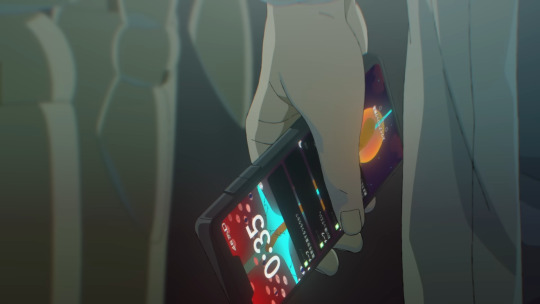
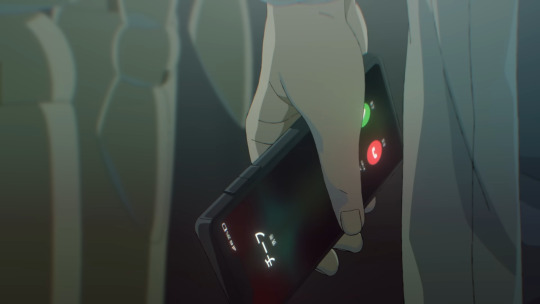
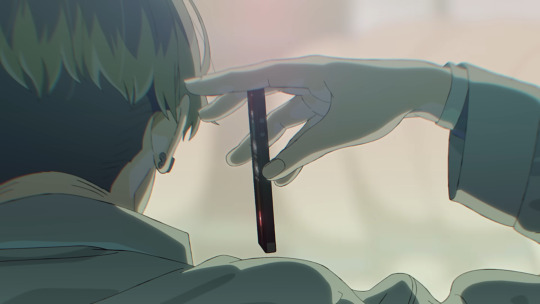
Translation of the texts are as follows (thank you rochisama on wordpress!):
- Regarding the first draft you submitted today, I think option B might be the best after all, so can you remake it by morning.
- Also, I forgot to mention, but you made a lot of mistakes with the one we spoke about earlier, so make sure it’s all fixed too. This one also needs to be ready by morning, so I’ll leave it to you to get everything ready.
- Oi, get back here now.
- Are you going to abandon your duties?
There are also two fun little details here with the phone: His lock screen is a picture of the Hanged Man, the same version that was on his shirt in MeMe:
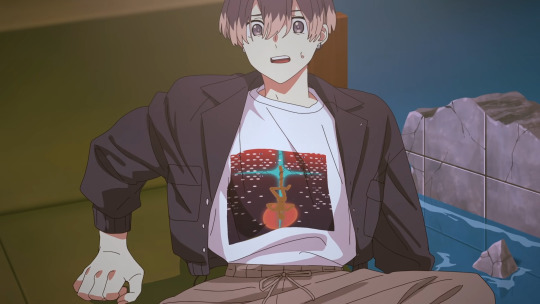
Also, His battery is at 29%.
Two of prisoner nine.
Later in the song, when his mom calls him, he immediately picks up, greets her energetically despite the bags under his eyes, and informs her he's doing well and not to worry.
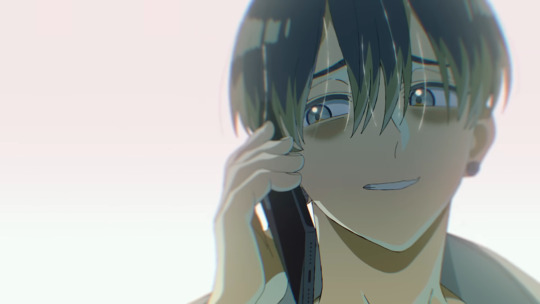
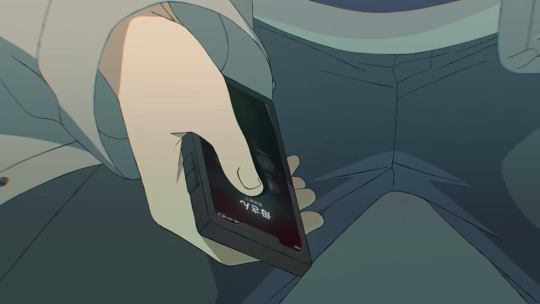
"Oh, hello? Mom? It’s been a while. Yeah… well, I mean, some days are hard, but… I’m doing alright, don’t worry. How’ve you been? I’ll go home next time I get some time off."
He also hangs up very quickly, as if he doesn't want to talk to her. He gives her placating words and then ends the conversation as soon as he can.
According to his S1 Interrogation questions, Mikoto's family consists of him, his mom, and his younger sister. His parents are divorced. He gets along well with both his mom and sister, but also states that he can't let his mom worry. This checks out with him hiding the truth from her, as letting her know just how badly he's doing would certainly cause concern. Keep all this in mind, it will become important later on.
Eyes
I don't have much of note to say about it right now, but eyes are a pretty heavy visual motif throughout the whole video.
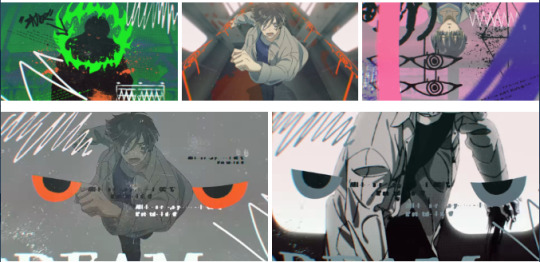
One thing I will say about it, though, is the large eyes across the whole screen show up twice: Once as orange, symbolizing John, and then as a grey-blue, symbolizing Mikoto.
Colors
There are five important colors: Blue, Green, Red/Orange, and Pink.
I'm grouping red and orange because I believe they both symbolize John. Blue is obviously Mikoto.
As I've mentioned, I am a fan of the 3koto theory- The visuals in the MV for MeMe, and even the composition itself, allude to 3 different entities (Music theory nerd here, hehe - I wanna write my own take on the 3koto theory eventually and talk about the way the song itself changes, but that's for another time.) And now in Double, it seems like there is still that imagery, albeit much less strongly than before.
So green, like in MeMe, symbolizes Midori/Midokoto/whatever you wanna call him. Pink is a little bit of a weird one, so I'll get to that in the moment. Anyway, let's start with some John moments.
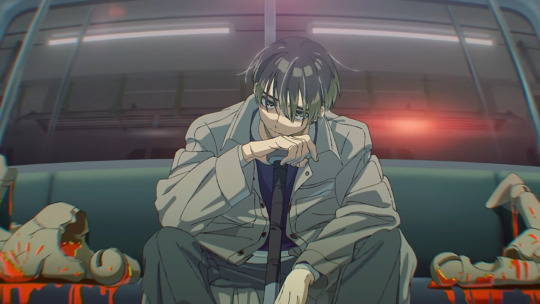
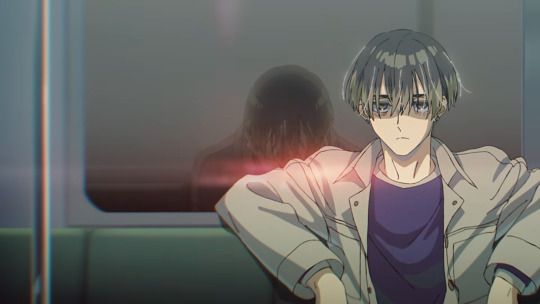
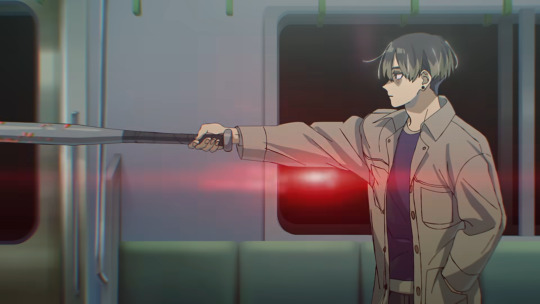
The red glow in the back shows that John is the one fronting in all three of these shots, with Mikoto being asleep behind him in the second one.
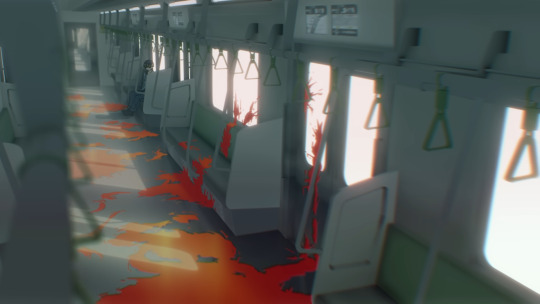
An example of blood splatters with an orange tint. This is part of the reason I think both orange and red symbolize Mikoto, since they're so interconnected here. Also, as mentioned in the eyes section, the eyes there are very orange whereas John is usually associated with red.
Speaking of eyes,

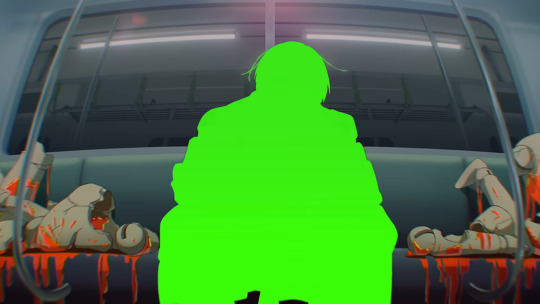
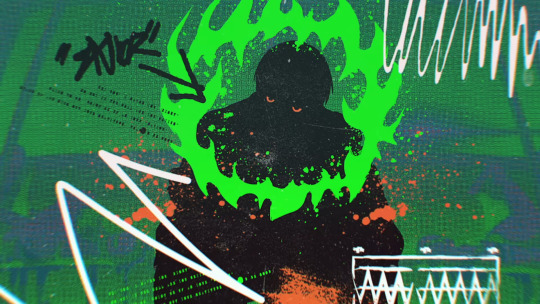
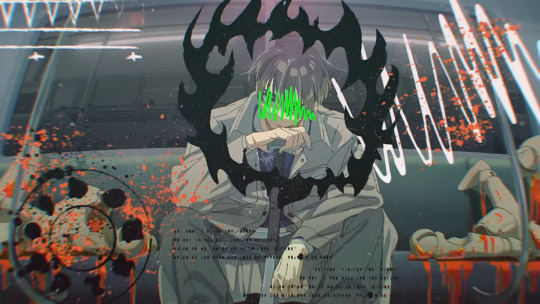
Huge 3koto implications in a few frames from this shot. John's body flashes green at one point, and the background and fire-halo are green when John's eyes are glowing orange. In the next image, the body's eyes are scribbled over in green. This scene in particular is very interesting to me, with both implications of Midori's existence and his connection to the eye motif. It also calls John "savior"
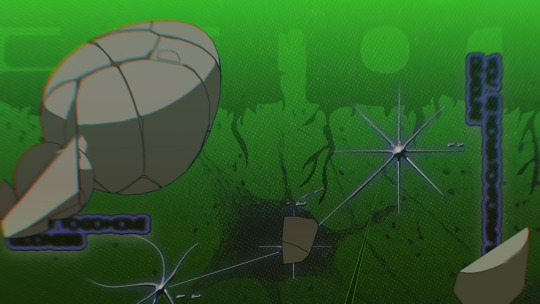
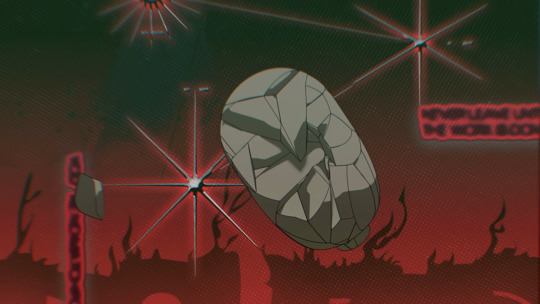
Here's another notable instance of 3koto near the beginning, right after John throws Mikoto's phone. Notice the color progression in the scene. Green background with blue text, down to red background and red text. John is clearly being portrayed as an outsider here, with Midori and Mikoto being a duo.
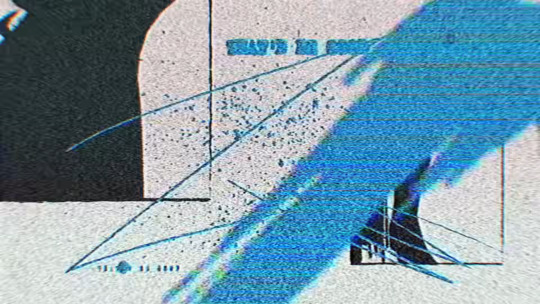
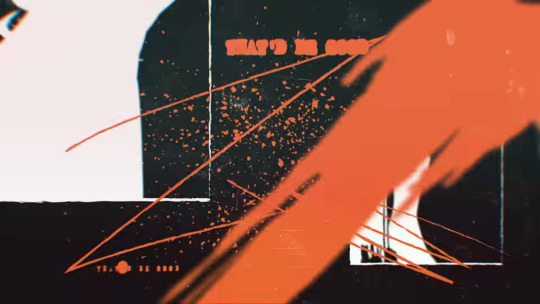

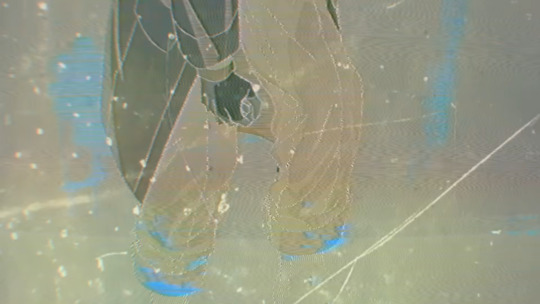
Going back to blood splatters, there are various points in the video where the "inverse" of the blood is either green or blue. This also checks out with both red and orange being John's colors; Blue is the opposite of orange, and green is the opposite of red. This also doubles (haha) as another example of John being the opposite of MikoMido
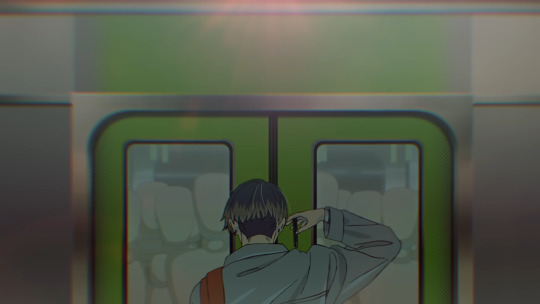
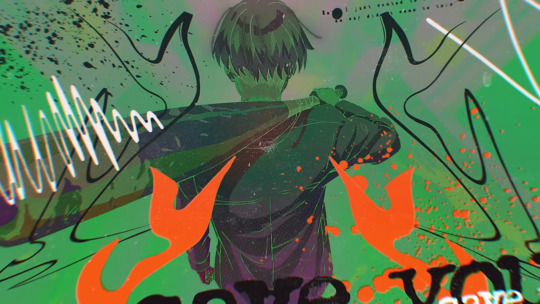
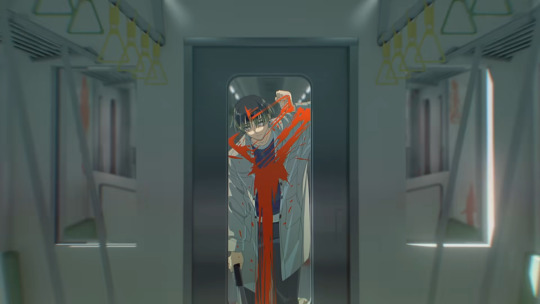
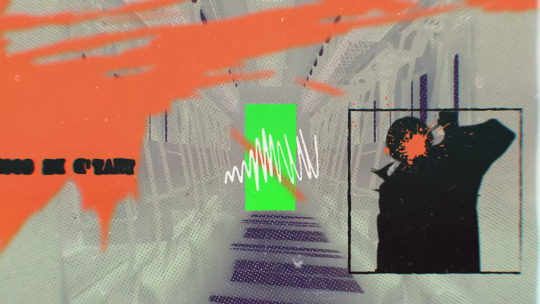
The train itself has a lot of green highlights. When John stares out the door into the other train cars, it flashes green a few times. It's not pictured here, but the door also flashes a staticky pink once, and so does Mikoto's body earlier in that same scene I showed where it's fully green.
Alright, more on pink now. I'm actually not entirely sure what it may symbolise, but my main guess is it's Mikoto's victims.
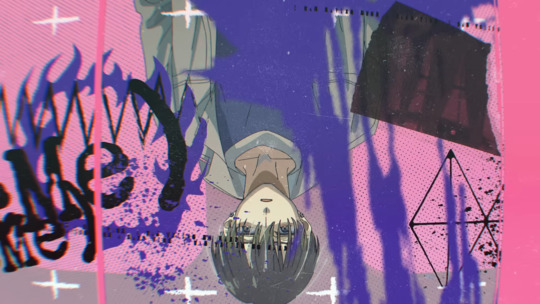
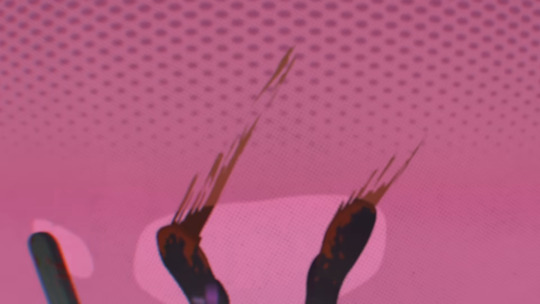
Aside from the instances mentioned above, these are the most prominent pink scenes in the video. Similar to how orange was juxtaposed against both blue and green, here it's against blue. In context, these scene also seems to me like a switch, a realization of what Mikoto has done. A brief instance where his memories coexist with him, and he's horrified at his actions.
Double - Overall Analysis
As pointed out in the colors section above, Midori seems to be very present still. He seems to be haunting the video in a way, lying just underneath the surface.
A really important aspect of DID that hasn't been directly addressed by MILGRAM is the fact that it's caused by childhood trauma, usually around the ages 9 to 10 or younger. For those who don't know, this is because young kids have not fully formed their identity and sense of self yet. Usually, kids will eventually consolidate all their various parts into one, which becomes their sense of self. But trauma literally changes how the brain works on several levels, and for some kids, that interrupts the process of those parts fusing together. (This is also why there's discourse behind the idea of an "original" personality - Which one is the "original" between a pair of identical twins, for example? One cell divided into two, so really neither of them are that first cell.)
My theory for Mikoto's childhood trauma and subsequent DID symptoms, is that Mikoto in his current form is the body's "first" alter, and that Midori was the original host. (I have several reasons for believing it's this and not the other way around, but it's not that important for this post. But do think about, "I'm already the fake one.")
We know that John specifically was created as a result of Mikoto's job stress, meaning he was obviously not around when Mikoto and Midori were kids. By the time the events of MILGRAM roll around, it seems like Midori is completely dormant, or at least very rarely fronts, as John seems to pretty clearly imply just his and Mikoto's existence in both Double and Neoplasm. But if John wasn't around when Mikoto was a kid, there has to have been at least one other alter throughout the course of Mikoto's life. You don't just suddenly develop DID at age 23 without having had it since you were traumatized (Unless the MILGRAM team is just clueless about DID, which is possible too but imo they've done a pretty decent job so far so I would rather believe in 3koto. I have faith in them, maybe that'll bite me in the ass eventually, who knows).
Mikoto's childhood trauma is not very clear, but I think it can be one of two main things, and they are likely connected: Either something to do with his parents' divorce, or the reason he is so against worrying his mom.
Mikoto clearly loves his mother a lot, but it seems like doesn't trust her on some level. He doesn't want her to worry, which is an understandable emotion, especially if she puts a lot of pressure on him to perform well, which I have a feeling is the case. (Full disclosure, I could be projecting my own experiences here, because I have had these same struggles with my own mom pressuring me to do well in school and such. But I think it's worth mentioning)
Mikoto clearly hates his job, but he doesn't get a new one. Referencing the Interrogation again, while he seems to enjoy the career path he's on (ie graphic design), the job he currently has is purely to make money, and not for his enjoyment. He also mentions in the Interrogation that he hopes someday he can start his own indie company. In the real world, it's actually very common for graphic designers to start with jobs in advertising, because it makes a lot of money. Then once they have enough to support themselves, they go on to projects they're more passionate about. So Mikoto's reasons for sticking with his advertising job could be either to make money or to satisfy his mom, or both. Again, I could very much be projecting here.
Now onto his dad and the divorce. I won't lie, I am not at all an expert in Japanese law, but I'm fairly familiar with US law because my mom is a lawyer here. So how it usually how it works in the US is that parents divide custody by either working out a schedule or by simply choosing which kid goes with which parent, unless one parent is abusive, in which case all kids go to the non-abusive parent. In Japan, however, apparently the mom is the default parent that kids go to, regardless of other situations, except in some extreme cases probably. Again, not an expert, but it seems that even if Mikoto's mom was abusive in some way, the court system would still give Mikoto and his sister over to her, especially if her form of abuse is purely psychological with no physical evidence. So this is one possibility, but even if both parents were good people and separated on friendly terms, divorce can be traumatizing for kids. It's unclear at what age Mikoto's parents divorced, but it seems to have been long enough ago that he doesn't even consider his dad part of his family. Meaning it's very possibly the main source of trauma that cause Mikoto's DID.
Neoplasm
Alright, finally it's time for the audio drama! This is a much shorter section, but there's a LOT here and I'm really excited about this one actually, because it seems like a step in the right direction for Mikoto and accepting John. He doesn't know it's DID, nor does Es try to tell him, but he acknowledges it as "sleepwalking", which is still super huge. If Kotoko and Es ever choose to inform him, it seems like they have a much better chance at getting across to him now than when MILGRAM started.
John being much more present and coherent is also big news, as he has a full on conversation with Es, and even receives a name from them. Although he expresses concern about this and "wishes he had stayed a monster", I honestly think this is amazing for both him and Mikoto. Along with the sleepwalking analogy, it's progress on their ability to accept themselves and each other.
John also sheds some light on his and/or Mikoto's murder, claiming that there were several indiscriminate victims, and that his memories are also fuzzy, citing that it's likely because he had only recently been born. To me, the most interesting part of this is the fact that John's memories are not intact. While he seems to think it's just due to not really being used to being alive, I think there's another explanation for it. Fuzzy memories are a very common symptom of DID, and most notably happens when one alter tries to access another alter's memories, often because they're being blocked. Maybe in a similar way to how Mikoto doesn't remember anything? 🤔
Another important thing here is that John claims that he is the one who killed people. But the most pressing question is, is he telling the truth?
We know that Milgram's criteria for what counts as murder and who counts as the perpetrator is very loose; For example, Yuno's abortions are enough to qualify her, and Fuuta doxxing Killcheroy is enough to qualify him. So it's not a stretch to think that maybe John really is the killer, and that Milgram just picked Mikoto as the person to be judged since he's the "main" alter. But this honestly doesn't sit right with me.
If there's one thing we know for certain about John and his dynamic with Mikoto, it's that he would do anything to ensure Mikoto's safety. Notice how he was incredibly nonchalant about the murder until Es pointed out that even with psychological evaluation taken into account, the death penalty is still very likely for Mikoto. As soon as they allude to Mikoto being in danger, John's attitude immediately switches, claiming over and over, very relentlessly, that he was the sole killer, and that Mikoto is innocent. His frantic behaviour is a very clear sign that this is survival mode; why would he tell Es the truth if it could put Mikoto in danger?
All of this really goes back to the major differences between them; Mikoto is honest and uses humor to cope, John avoids being open and lashes out at people. Mikoto straight up blocks all the bad memories, John is aware of them but has a hazy recollection of events.
So while it's a possibility that Mikoto is innocent and that John is the killer, I find it much, much more likely that Mikoto did it and then blocked his own memories, and that John is lying about the situation to protect Mikoto. It's what he's always done, after all.
Final thoughts - Forgiven vs Unforgiven
This may be an unpopular take, but I think as of right now, my first instinct is to vote Mikoto as Unforgiven. I'd like to point out that there's a difference between Innocent vs Guilty, which is how the terms are officially translated, but in Mikoto and John's case I think they are interconnected. There are cases in Milgram where I think they're completely separate ideas and cases where I think the difference is moot, and MikoJohn definitely fall into the latter one.
I also am very conflicted on the concept of Metavoting; for example, Amane being voted Unforgiven was an incredibly stupid decision on the majority's part and I'm not afraid to state that. (Tbf Her mental state is delicate enough that forgiving her would also not end well, but lesser of two evils imo. But all that's for another time.) However, with MikoJohn, again, it actually aligns very well with my actual judgement. John very clearly states that it's his belief that forgiving Mikoto will reduce Mikoto's stress, and allow John to fade away. Whether this is a good or bad thing, or neutral even, is pretty complex honestly, but I think for me personally, I would view it as a bad thing.
Again, I am not very open about my system-isms, but I relate a lot to Mikoto in his current state of being unable to accept John's existence. I was in that exact same position once, and for me, accepting the existence of my alters was very beneficial to all three of us, and we are much closer now and less stressed overall. If John continues to exist, that means Mikoto will have a chance to figure things out and accept John's existence. But if John fades, he may be still caught in that perpetual state of half-existence, with Mikoto being unable to accept him.
So with all these things together; the fact that Mikoto is the one we are judging and I am pretty sure he is the killer, the fact that John may fade if Mikoto is forgiven, and how that isn't a good thing in Mikoto's case, and the fact that - I am pretty damn sure I want to vote Mikoto as Unforgiven. This isn't the be-all, end-all, of course. We don't know if John's prediction is correct about disappearing, we don't know if voting Mikoto Unforgiven will actually have the opposite effect that I hope for and drive him to his breaking point, hell we still don't know who did it. My opinion may change because again, this is just my initial thoughts. I'd love to interact with other systems about this and see their thoughts and opinions. Thank you for reading if you made it this far!!!
Translations, Resources, Etc
Chief's texts, translated by rochisama on wordpress
Interrogation questions, referenced from the MILGRAM Wikia. I'm unsure of the translator, sorry.
A/V of Neoplasm, edited by ac on youtube, featuring translation by onigiriico
kayanomikotoba's Triokoto theory (fun fact, this post is one of the main reasons I got into MILGRAM!)
A quick overview on Japanese divorce law, specifically by the US foreign embassy but it's good enough for my purposes
#milgram#kayano mikoto#this is super long and maybe be disjointed but idk i just had to get it out there#this took almost 4 hours. i havent even had breakfast#roach talk#LMK IF THERES ANY GLARING ERRORS LIKE IF SENETENCE JUST ENDS ABRUPTLY OR SOMETHING ack i did proofread several times but i dont trust mysel#to catch all errors asfdgfhd#3koto#triokoto#how do i tag all that#milgram theory#??
66 notes
·
View notes